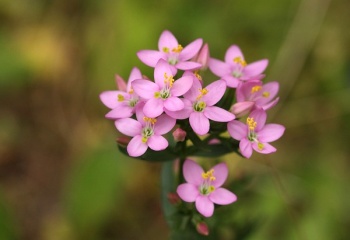Centaury
Other Names : Centaurium erythraea, minor centaury, Gentiana centaurium L., Erythraea centaurium
Centaurium minus, Centaurium umbellatum, lesser centaury, centaury herb, centaurri herba, common centaury, feverwort, filwort, bitter herb, red centaury, Christ's ladder, centaury gentian.
Each plant’s part except the root is applied in dried form.
See also : Bach Flower Remedies
Special Precautions of Centaury
Health Benefits and uses of Centaury are
The whole herb is used medicinally. Historically, centaury has been used as an herbal medicine to kill worms, to treat dropsy, as a sedative, to treat snakebite and other wounds, and topically for freckles and spots. This bitter herb enhances production of gastric secretions, which stimulates appetite and improves digestion. Long-term use of the herb is required for the tonic effects on the stomach to fully develop.
- As for one of the main health benefits of centaury, its role as a stomach tonic, this derives from its ability to stimulate gastric secretions, thus relieving dyspepsia, indigestion and a bloated feeling in the stomach. Centaury also stimulates bile production which aids digestion and filters harmful substances from the liver and gallbladder, minimising the risk of diseases such as jaundice and hepatitis. Centaury is used for loss of appetite (anorexia) and upset stomach (dyspepsia).
- To induce bile movement, treat liver conditions, cause vomiting, and reduce fevers.
- To treat extreme thirst, drink the centaury infused in hot water. This will quench thirst, and clear the breast and stomach.
- A decoction of the plant can be used as a rinse to get rid of head lice, a decoction can be made by boiling 30 grams of the herb in a litre of water for 20 minutes, while the following infusion can be made and taken half an hour before meals to prevent heartburn.
